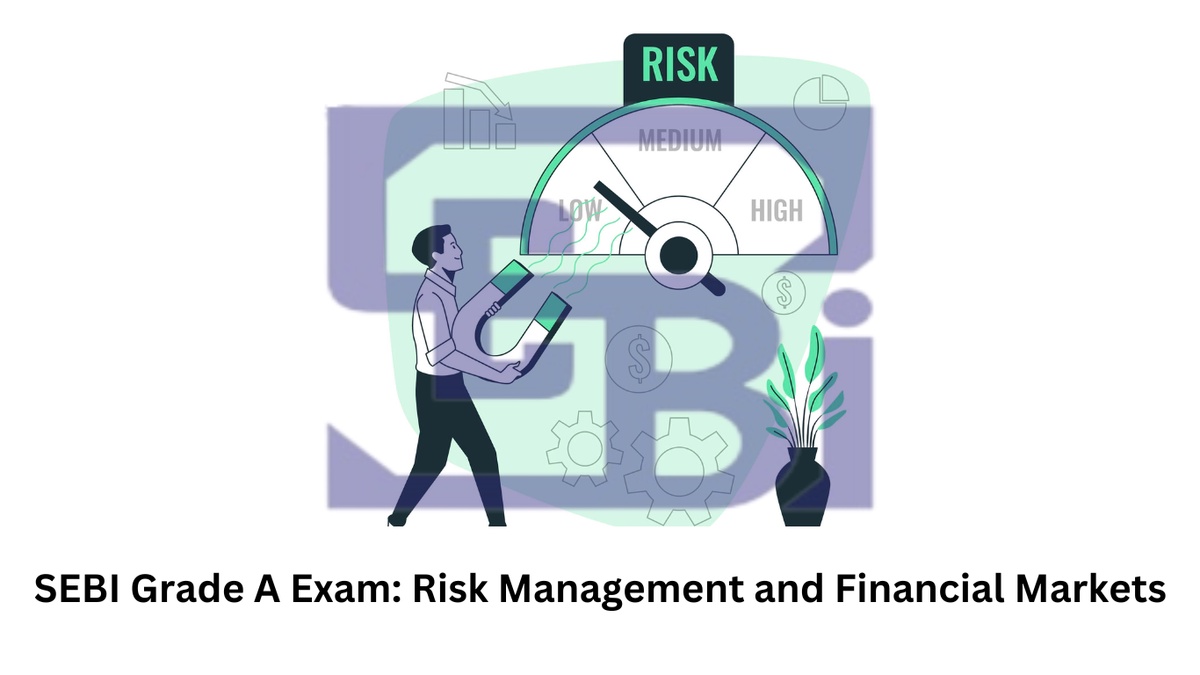In the dynamic landscape of financial markets, where uncertainty is the only constant, effective risk management emerges as a cornerstone for sustainable growth and stability. For aspirants eyeing a career in securities markets, the Securities and Exchange Board of India (SEBI) Grade A Exam stands as a pivotal gateway. Beyond its examination, it serves as a testament to the intricate interplay between risk management and financial markets.
Understanding SEBI Grade A Exam
The SEBI Grade A Exam is a prestigious examination conducted by the Securities and Exchange Board of India to recruit officers for various streams including General, Legal, Information Technology, Engineering, Research, and Official Language. Among the plethora of subjects covered, Risk Management holds a paramount position owing to its intrinsic significance in regulating and supervising the Indian securities market.
Delving into Risk Management
At its core, risk management encompasses the identification, assessment, and mitigation of potential risks that can impede the attainment of organizational objectives. In the context of financial markets, it assumes heightened importance due to the inherent volatility and complexity associated with market dynamics.
Market Risk
Market risk, often regarded as the most prevalent form of risk, emanates from fluctuations in market variables such as interest rates, exchange rates, and asset prices. SEBI Grade A aspirants delve into the nuances of market risk management techniques including Value at Risk (VaR) models, stress testing, and scenario analysis to gauge and mitigate the impact of adverse market movements.
Credit Risk
Credit risk arises from the possibility of counterparty default, wherein a borrower fails to honor their financial obligations. Within the SEBI Grade A curriculum, candidates explore credit risk assessment methodologies, credit derivatives, and credit enhancement techniques to fortify the resilience of financial institutions against credit defaults.
Operational Risk
Operational risk stems from internal processes, systems, or human error, posing a threat to the integrity and efficiency of financial institutions. Aspirants preparing for the SEBI Grade A Exam familiarize themselves with operational risk management frameworks encompassing risk identification, control, mitigation, and monitoring mechanisms to safeguard organizational assets and reputation.
Financial Markets: A Confluence of Opportunities and Challenges
The financial markets serve as the fulcrum of economic activity, facilitating the efficient allocation of capital and fostering investment opportunities. However, amidst the allure of profitability lies an intricate web of risks that necessitate adept management and oversight.
Equity Markets
The equity markets, characterized by the buying and selling of company shares, offer investors the prospect of capital appreciation and dividend income. SEBI Grade A aspirants gain insights into equity market dynamics, regulatory frameworks, and trading mechanisms to navigate the intricacies of equity market operations and risk management.
Debt Markets
Debt markets serve as a platform for the issuance and trading of debt instruments including bonds, debentures, and treasury bills. Within the ambit of the SEBI Grade A syllabus, candidates delve into debt market instruments, valuation techniques, credit ratings, and regulatory frameworks governing debt market transactions.
Derivatives Markets
Derivatives markets encompass a myriad of financial instruments including futures, options, swaps, and forwards, enabling market participants to hedge against price volatility and speculate on future market movements. Aspiring SEBI Grade A officers acquaint themselves with derivative pricing models, trading strategies, and risk management practices to mitigate exposure to derivative-related risks.
The Regulatory Imperative: SEBI's Role in Safeguarding Market Integrity
As the apex regulatory authority for the Indian securities market, the Securities and Exchange Board of India (SEBI) assumes a pivotal role in fostering market integrity, investor confidence, and financial stability. Through proactive surveillance, enforcement, and regulatory interventions, SEBI endeavors to uphold market transparency and mitigate systemic risks emanating from market malpractices and misconduct.
Conclusion
In the dynamic milieu of financial markets, adept risk management emerges as a linchpin for sustainable growth, investor protection, and market resilience. The SEBI Grade A Exam serves as a testament to the symbiotic relationship between risk management and financial markets, fostering a cadre of competent professionals equipped with the requisite knowledge and acumen to navigate the intricacies of securities regulation and supervision. As aspirants embark on their journey towards SEBI Grade A certification, they embark on a transformative odyssey characterized by intellectual enrichment, professional growth, and enduring contribution to the integrity and vitality of India's securities market landscape.


No comments yet